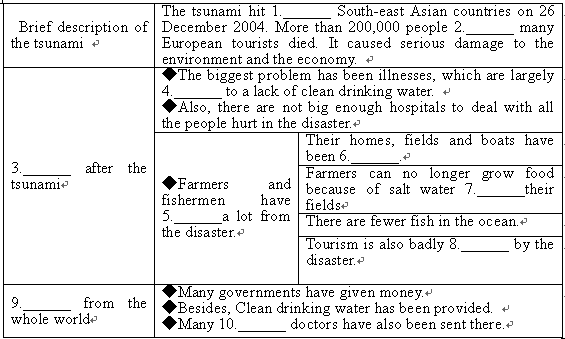任务型阅读。请认真阅读下列短文,并根据所读内容在文章后表格中的空格里填入一个最恰当的单词。
注意:每个空格只填一个单词。
Disaster (灾难)strikes South-east Asia
The tsunami (海啸) which hit twelve South-east Asian countries on 26 December 2004 was a great disaster.
More than 200,000 people died in the tsunami. Not only did people living in Thailand, Indonesia and Sri Lanka
die, but many European tourists who were on holiday in these countries also died. Now, we are just beginning
to understand how much damage was caused to the environment and to the economy.
The biggest problem after the tsunami has been illnesses which have spread to many people. These illnesses
are mostly caused by a lack of clean drinking water. People are drinking dirty water because there is no other
water available. This dirty water is making them sick. Also, the hospitals in these poor countries are not big
enough to deal with all the people who were hurt in the tsunami.
Many people who live in the areas hit by the tsunami are farmers and fishermen. The tsunami destroyed
their homes, their fields and their boats. The salt water from the ocean covered the farmers' fields, so they can
no longer grow food. Also, fishermen are finding that there are fewer fish in the ocean. Now, these people,
who were already quite poor, have no way to earn money. No one knows how long it will take for the fish to
return, or for the farmers to be able to grow food again. Tourism is also very important in these areas, but
many famous tourist areas are destroyed during the tsunami.
The whole world is helping these countries recover from the tsunami. Many governments have given aid
money. UNICEF, the United Nations Children's Fund, has set up 200 places where people can get help. It has
also provided clean drinking water. One organization called Médecins Sans Frontières (Doctors without Borders)
has sent many doctors to care for sick people. In Indonesia, some government officials think that some villages
should be moved away from the ocean, and that farmers should learn how to grow different types of food.
No one knows how much money or how much time it will take for this area to recover completely. However,
with the help and aid that is being sent to the affected areas, hopefully it won't take long.
Disaster strikes South-east Asia
